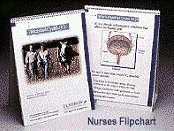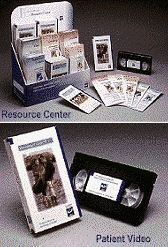
Date: October 5, 1999
Interstitial Cystitis Network - Chat Log (© 1999, www.ic-network.com)
Topic: Update from Alza - Elmiron Resources & Research Studies
Speaker: Eldon Mayer, Product Manager, Alza Pharmaceuticals
<icnmgrjill> Welcome everyone to the ICN "Meet the Expert" chat for October 5, 1999. Our guest speaker tonight is Eldon Mayer, of Alza Pharmaceuticals. Eldon is the Senior Product Manager for Elmiron in the USA and here tonight to share with you some of the history of Elmiron, as well as current research studies and news. Welcome Eldon!
<EMayer> Thank you Jill. I would also like to say welcome to everyone who has joined us this evening. I appreciate the opportunity to be here tonight and to answer questions from you all. I'll take as much time as needed to answer questions, but first I'd like to tell a little bit about who I am and, of course, a little bit about the product.
----------------- PRESENTATION BEGINS --------------------
I have been with Alza for about 15 months in the home office in Mountain View, California. I'm responsible for all Elmiron marketing activities. I've been in the pharmaceutical industry for over ten years and have really enjoyed working on Elmiron and with the IC community for the past 15 months. Tonight, I'd like to tell you a little about the background of Elmiron, marketing issues, some of our medical and patient education programs, IC awareness, and lastly current clinical research initiatives
(1) Background of Elmiron:
Elmiron, or Pentosanpolysulfate Sodium, is an oral heparinoid. It is actually derived from Beech tree bark and was launched by Baker Norton, the pharmaceutical division of IVAX, in the US in October of 1996. Alza acquired Elmiron from BN in November of 1997. Elmiron is promoted by Alza through 105 Alza specialty sales representatives to about 7500 urologists and 3000 OB-Gyn's throughout the USA.
Elmiron is the first and only oral drug approved by the FDA for the relief of the bladder pain and discomfort associated with IC. In addressing marketing issues for IC, we've identified four primary issues:
- a relatively poor understanding and low awareness of IC among physicians
- a reluctance of many physicians to treat IC (We are doing substantial medical education efforts to address this.),
- a general misunderstanding of Elmiron efficacy. Specifically, there is limited data available and there is an inconsistency in some of the results. Clearly, further study is needed. I'll tell you more about this later.
- Lastly, there is a general low public awareness of IC. In marketing Elmiron through physicians and other audiences, we constantly work to raise the awareness of IC in the medical community.
(2) Medical Education Efforts:
- We've conducted numerous advisory board meetings with urologists throughout the country in the past year.
- We've conducted teleconferences to over 1000 urologists and ob-gyns.
- We've conducted a number of dinner meetings and speaker programs.
- We've also conducted programs at various physician conventions.
- Also, we're working very hard to get IC articles published in various urology journals
A few things that you'll want to pass along to your medical care provider are:
We have a great slide kit called "The Painful Bladder" that enables physicians to educate others about IC. This is available at no cost through any Alza representatives to physicians.
We have a series of newsletters called "ICON - Interstitial Cystitis Observation and News" that we've developed specifically for physicians and nurses. Again, your care providers can receive this through our reps or by contacting our Medical Communications Department at 1-888-Elmiron.
We recently completed
a mass mailing to urologists throughout the country, including a series of articles
from the Urology Times which were distributed on a monthly basis over
 a period of seven months. Another program that we've recently launched is a
Nursing Flip Chart intended for the urology or OBGYN which is intended
to help educate the patient about IC and what their options are.
a period of seven months. Another program that we've recently launched is a
Nursing Flip Chart intended for the urology or OBGYN which is intended
to help educate the patient about IC and what their options are.
<icnmgrjill> Eldon, we've heard great things about this newsletter! One of the things that patients need to understand is that the pharmaceutical companies play a vital role in physician education mostly because patients groups, like the ICA or the ICN, can't afford to do large PR or awareness campaigns. So, Alza plays an essential role in just educating and legitimizing IC as a disease that can be treated! This newsletter is getting rave reviews from the IC community so please tell your doctors about it!
<EMayer> I'd like to tell you about some of the materials we've designed to help educate the patient.
- We have a Drug Assistance Program for patients who can't afford Elmiron and don't have insurance coverage. To apply, simply call 1-800-577-3788. The level of assistance that we can provide will depend upon income and cost of living.
- One program that we recently rolled out is called the "IC Resource Center." This is a kit which holds all ALZA patient education materials as well as materials reprinted from the ICA.
- We have a new video "Interstitial Cystitis: Positive Steps on the Road to Relief" that provides some excellent information, patient testimonials and expert IC physicians that is very encouraging, particularly for someone recently diagnosed. Featured on the video are Dr. Robert Evans, Dr. Grant Mulholland, Terri Jo Myers as well as other patients.
- Last, but not least, we've launched a new patient support program called "Turning Point." This is a program through which patients diagnosed with IC can get a series of self help materials designed to increase your knowledge of IC as well as their treatment options. The goal is to help you manage your IC. In particular, there are three separate newsletters for the patient, containing an array of self help information. A sample of an IC cookbook called "Sampling the Good Life" by Bev Laumann (This is selections from her book "A Taste of the Good Life"). A relaxation audiotape by Barry Konicov and a pill holder and some reminder letters! To enroll in Turning Point, you can call 1-888-Elmiron.
- We also have a Patient Starter Kit which includes a Q&A booklet on IC, a voiding and diet log, and an audio cassette. You can request the starter kit from your physician. If he or she is out, we can certainly send them more.


(3) General Public Awareness:
As many of you know, Terri Jo Myers, professional golfer, IC patient and mother, has served as a spokesperson for IC and Elmiron in the past. We have conducted an extensive media activities with Terri Jo around LPGA events in large cities. The response from the press has been excellent. For example, in Nashville, we conducted nine television, radio and newspaper interviews and had similar responses in Boston and Atlanta.
Another of our awareness initiatives is a patient waiting room booklet which is distributed to urologists and Ob-Gyn's. We have a number of plans for the year 2000 and have two PR companies working on the project.
(4) Clinical Initiatives for Elmiron:
There are two major clinical trials now underway with Elmiron and IC. One is a multi center, double-blinded randomized dose ranging trial. The purpose of this trial is to determine the optimal dose of Elmiron on an IC patient.
When the FDA approved Elmiron, it was based on two clinical trials which used Elmiron at 100mgs TID (three times a day). Since that time, there has been discussion among investigators and clinicians of whether this dosage is optimal (most effective). So, in our new studies, we testing three differing dosages, 100mg TID, 200mg TID and 300mg TID. Please be aware that this investigational only. We are NOT advocating the usage of these higher doses because the safety and efficacy has not yet been determined in this trial. The trial should be completed towards the second half of the year 2000. To inquire about the locations of the research centers involved, call 1-888-Elmiron.
The second Elmiron studies are being conducted by the National Institutes of Health. Elmiron is being investigated with Atarax (Hydroxyzine) in a four arm clinical trial. The arms are: (a) Elmiron alone (b) Elmiron & Hydroxyzine (c) Hydroxyzine alone and (d) placebo. The trial was initiated in August of 1999 and should be completed in the latter half of next year.
The premise of investigating these treatment regimens is that IC may likely contain an allergic component and to determine if the combination of these two drugs is more effective than either alone. It is also known that hydroxyzine provided relief to many patients, though it has never been demonstrated in a trial.
For further information about Elmiron and safety, please visit the Elmiron web site at: http://www.elmiron100.com
-----------------PRESENTATION ENDS--------------------
<icnmgrjill> Thank you Eldon. As patients, we definitely need to be kept informed of the various studies out there! One of the challenges that we've all had in the past several years is that it is very difficult to get the media to talk about bladder diseases. We've done countless letter writing campaigns to Oprah, Dateline, 20/20, Montel to no avail though, happily, some patients are getting their local papers to do small stories. Are you finding that the press is getting more receptive??
<EMayer> I would say that our public relations efforts, so far, have been successful. We've usually associated them with an event or a personal success story that the media feels is newsworthy, like an LPGA event, Terri Jo Myers or even a clinical trials announcement.
<icnmgrjill> So, this is an important point for all of you! PR is not a one person or one company activity. If we want more exposure for IC, it's going to take not only Alza's work, but each one of yours too! Find a compelling IC story (or someone willing to tell their story) and then go to your local press or newspaper and ask for coverage. I'll have more info on this in our new ICN activists corner!
<icnmgrjill> Okay, let's take questions from the floor. Question #1 is from CarolL. She says that she is taking many drugs and is wondering if Elmiron is safe to use, in conjunction with various other meds.
<EMayer> At this time, drug interactions for Elmiron have NOT been conducted. However, no serious drug to drug interactions have been observed in all of the clinical trials of Elmiron. It is important to note that Elmiron, as a heparinoid, is a mild anticoagulant. If you are taking any other anticoagulants, such as coumadin, high dose aspirin or ibuprofin, you should talk with your physician before taking Elmiron. We plan drug interaction studies in the year 2000.
<icnmgrjill> Another question from the floor. Have you been able to determine why physicians are reluctant to treat IC?
<EMayer> There are a number of reasons why. One reason is that physicians are under the impression that IC is a rare and severe condition. Some mistakenly feel that there is no easy way for them to diagnose or treat IC. Obviously, they are wrong.
Also, urologists are generally considered the only ones who are able to treat this by most other physicians. Urologists are trained as surgeons and, as such, are mostly interested in patients that can augment their surgical practice. They seem to be reluctant to treat patients that require long term management and care and are usually looking for a quick fix, such as surgery, which is clearly not appropriate for IC.
Mostly, their reasons for not wanting to treat IC is based on misunderstandings and misconceptions of just IC. So, we're working very hard to educate and explain this in medical education campaigns.
<icnmgrjill> ICN Terri wants to say thank you to Alza for providing her with almost $500 worth of Elmiron when she couldn't afford it.
<EMayer> You're very welcome and I'm glad that I was able to help. I never want to see people go without care for reasons of cost!
<icnmgrjill> Mal wants to know if a patient who didn't have a favorable response the first time can take Elmiron for a second series.
<EMayer> First of all, I'm not a physician and can not give medical advice. According to the Elmiron package insert, if improvement has not occurred and if limiting adverse events are not present, Elmiron may be continued for another three months. It also important to note that six months of therapy at 100mgs TID is generally required for significant improvement, according to clinical studies.
<icnmgrjill> Alexa lives in Canada and would like to know if any awareness is being done up there?
<EMayer> Alza does have a Canadian division and Elmiron is promoted to Canadian physicians. However, the market is much smaller and their efforts are smaller because of that. Still, they have been quite successful in their endeavors.
<icnmgrjill> Sherry wants to know if there is research on the side effects of long term use of Elmiron?
<EMayer> That research has already been done and is now available. In an eight year retrospective study, adverse events tended to be infrequent, mild and tended to come and go. These included: diarrhea, nausea, localized alopecia (which was reversible upon discontinuation), headache, rash, upset stomach, abdominal pain, liver function abnormalities and dizziness. These occurred in 1-4% of patients.
<icnmgrjill> One of the common questions, Eldon, are from patients who feel that they haven't had a response to Elmiron. They are unsure of whether to keep going or stop the medication. (i.e. after two weeks, versus two months, versus six months versus a year) Obviously, none of us can answer this question because it is medical advice and only a physician can make general recommendations to patients. But, would it be fair to say that a two week trial just isn't long enough to know if it would be beneficial?
<EMayer> Yes, that would be fair. It would also be fair to say that after a year, the patient may want to ask their physician about other therapies.
<icnmgrjill> On average, how soon have patients seen an improvement?
<EMayer> The answer to this question is limited by the clinical studies conducted. Patients were assessed at three and six month intervals. Current clinical trials are assessing response at more frequent periods of times, like one month, two month etc. Therefore, we should soon know just how long it takes at various doses to get a response on Elmiron. I wish that we had all of the answers now because I know that you'd like more concrete information. I can only say that it takes time for drugs to be developed.
<icnmgrjill> Our last question is from Charlie. Charlie wants to know if you have seen any variations in the response of men versus women to Elmiron?
<EMayer> First of all, we don't have that information yet. However, because men are, on average, larger than women, many clinicians are questioning whether men should be taking the same dose of elmiron. We hope to have the answer to that in the next year or so!
Please review the ICN Disclaimer:
Active and informed IC patients understand implicitly that no patient, or web
site or presentation on a web site should be considered medical advice in all
cases, we strongly encourage you to discuss your medical care and treatments
with a trusted medical care provider. A copy of our more extensive disclaimer
can be found at: www.ic-network.com/disclaimer.html
© 1999, The IC Network,
All rights reserved. This transcript may be reproduced for personal use only.
If you do so reproduce, we ask only that you give credit to the source, the
IC Network, and speakers, Eldon Mayer and Jill Osborne. For additional use,
please contact the ICN at (707)538-9442.